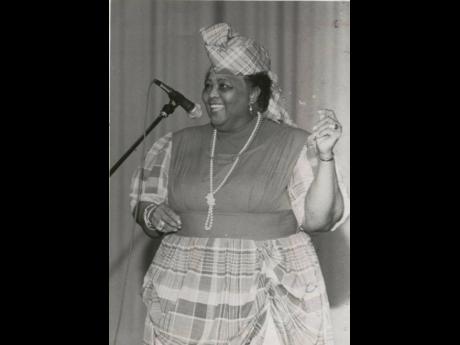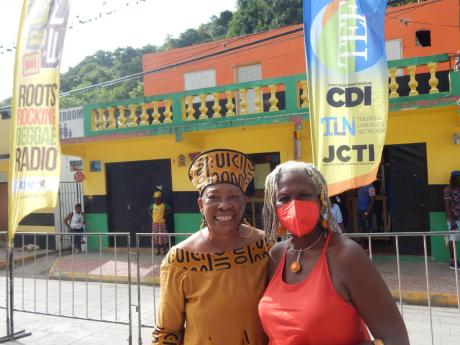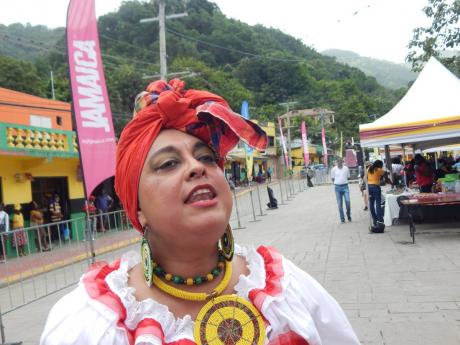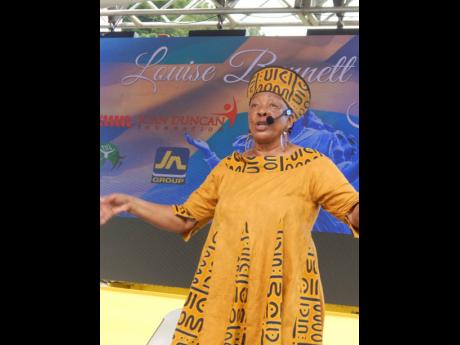Organisers of Miss Lou Festival want to make it annual event
Group focusing on protecting Louise Bennett Coverley’s legacy
One of the highlights of October was the Miss Lou Festival in her Jamaican home community, Gordon Town. It was referred to as the inaugural festival as the organisers, the Louise Bennett Coverley Festival Committee, headed by Opal Palmer Adisa, hopes to make the event annual.
One of the highlights of the festival were the echoes of the theme of Mervyn Morris’ 1963 essay ‘On Reading Louise Bennett, Seriously’. Appropriately, the echoes were aural and were on Morris’ title, tweaked to become ‘On Speaking Louise Bennett Properly’.
The speakers suggested, and sometimes declared, that there is a way to speak ‘properly’ what many call ‘bad English’ – and others call creole, dialect, patois, and Jamaican language. Among those making the declaration to The Gleaner were Professors Carolyn Cooper and Opal Palmer Adisa, Dr Amina Blackwood Meeks, and in her performance, the Canada-based, Jamaican folklorist, singer and poet Tania Hernandez.
Had Morris been at the festival, he would have agreed with his colleagues, for in another essay on Bennett Coverley, ‘Miss Lou, Some Heirs and Successors’, he writes of several other Jamaican poets who “thank Miss Lou for valorising folk/African culture in Jamaica and for showing the world that Jamaican Creole can be a legitimate language of literary art”.
It can be used for serious academic purposes, too. “I delivered my inaugural professorial lecture in Jamaican,” Cooper said.
She continued: “One of my issues is the way in which Miss Lou’s work is performed. It is just raucous. There is no subtlety. I think we need to try to help people understand that Jamaican is not a brawling language.
“We have different registers. When some of these people perform Miss Lou’s poetry, it sounds like quarrelling. As we think about Miss Lou’s legacy, we need to think about the language itself and the tone and the way in which it can express more than anger. It can express tenderness, it can express love.”
She said that Bennett Coverley was someone who decided from early that the stigmatisation of the language was something that she had to challenge. “Miss Lou said that as a child, people felt everything about us (Jamaicans) was bad – black people bad, you talk bad, you hair bad,” Cooper added.
“And she said she knew these people (her family and community) were not bad and their language wasn’t bad. So she tried to rehabilitate the language in the sense of getting us to understand that the negativity that we associate with the language is not something that we should embrace.”
Cooper expressed concern about Miss Lou’s legacy. “Many people don’t understand what it really is. I’m hoping that events like this festival will help to keep her legacy alive,” she said.
That was precisely Palmer Adisa’s purpose in creating it. She had been to a number of places to speak on Miss Lou, including Florida, where, she said, an annual Miss Lou festival had been mounted for a decade.
“I thought, why don’t we have one here (in Gordon Town)? This is her territory. So after I published 100 Voices for Miss Lou (in 2021), going with the flow, this would be next step,” she said.
On the performance of Bennett Coverley’s writings, she said that she, like Cooper, found interpretations generally “too loud and brash”.
She said: “You know, we think of her always as a joking, smiling person even though I have different interpretations of Miss Lou’s poems. I read the poems with much more nuance, as much more complex. So I want, and I’m hoping, that people will begin to look at her work really closely.
“She had a very specific objective – to just glorify the ordinary Jamaican, and I think right now in our society we really need to appreciate and respect the ordinary Jamaican. And we also need to revive some of the culture and proverbs which have moral teachings about how we should come together.”
REMOVED FROM FRINGES
Blackwood Meeks suggested that Miss Lou “should be removed from the fringes of the school curriculum, from the confines of entertainment and become central to the curriculum so that the children can learn more about her, can learn how to interpret her work, can understand the historical references in our material”.
Hernandez, who lives in Hamilton, Ontario, said she had been promoting Jamaican culture for 20-odd years in Canada but had really started when she was a schoolgirl at Holy Childhood High in Jamaica. Her love for Bennett Coverley’s works began, she said, when she watched the JBC television programme Ring Ding, which Miss Lou hosted. She went on to perform the poems in public-speaking contests and then in Jamaica Festival.
In Canada, she said, she continued reading Bennett Coverley and “got a calling”. She explained: “She says teach the pickney them what belongs to them and I got a calling, and there and then, I became a Miss Lou tribute performer. At primary schools, I would sing folk songs, I would tell Anancy stories, I would cook Johnny cakes. I would even get a map of Jamaica and have the children write up about the parishes and mark where every one of the 14 parishes are ... . I teach them folk dance.”
She said that the Jamaican/Caribbean community is so strong that she always feels like she is still in Jamaica. “In Hamilton where I live, we have the Jamaica Foundation of Hamilton. We also have the Afro-Canadian-Caribbean Association and we have the Afro-Canadian Association of Toronto.
“We have a whole lot of associations, and we are patriotic to the point where next week, I am going back to Hamilton to be designated as Goodwill Ambassador by the Jamaica Foundation of Hamilton. I feel so honoured.”
At the festival, after her performance, with not a hint of raucousness, Hernandez presented Palmer Adisa with a framed copy of a song she had dedicated to Miss Lou as well as a cheque for US750 towards festival expenses. The cheque came from money that she and her sister in America had collected from Miss Lou aficionados in the US and Canada.




